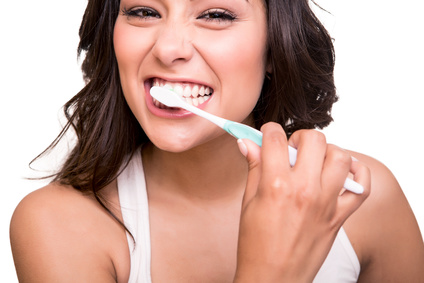It’s common knowledge that brushing and flossing twice a day is essential to taking care of your teeth and gums, but even with this ritual in place your dental health could still decline over time based on the types of foods you eat on a regular basis. It’s important to educate your child early on in the importance of a balanced and nutritious diet that can keep them from developing cavities, gingivitis, or a more serious periodontal (gum) disease later in life.
Why does nutrition matter if I rigorously brush and floss my child’s teeth?
Most of the population concentrates on tooth care first thing in the morning and right before bed – but what about the meals and snacks consumed throughout the day? Leaving food or food particles – especially carbohydrates and sugars – in your child’s mouth for an extended period of time is the main cause of tooth decay.
What foods should I watch out for?
- No surprise, sugar is one of the worst foods for your teeth and gums. Avoid added sugars that come from food and beverages; especially those that linger on the teeth such as lollipops, hard candies, cough drops and sodas, which all continuously coat the teeth with sugar.
- Completely removing added sugar from your child’s diet is ideal, but if that’s a challenge, try serving sugary foods along with a meal or another type of food. During larger meals, saliva production is higher which helps to wash away food particles before they attack teeth.
- Highly acidic foods. Pickles, breath mints and citrus juices have a similar effect to sugar when lingering on teeth. Like any harmful foods, these are also best eaten with other foods when saliva production can help neutralize the acids.
- Sticky or chewy foods. Dried fruit, granola bars, honey, syrup, caramel and oatmeal or peanut butter cookies stick to teeth and make it difficult for saliva to wash away. Sticky foods retain sugar in the mouth longer than other foods, so brushing immediately after eating is best.
- If your child chews gum, try xylitol-sweetened or sugar-free gum. Xylitol has been shown to reduce the amount of bacteria that produce the acids that cause cavities.
What meals & snacks promote dental health?
- Sounds simple, but offering your child water instead of soda or juice can go a long way. Water doesn’t harm your teeth and helps to wash away food particles. Additionally, fluoridated water – containing fluoride – helps to make teeth more resistant to the acid that can cause cavities.
- Milk & Dairy. Milk and diary products like hard cheeses and yogurt help build strong teeth and bones and are low in sugar.
- If your child doesn’t like milk or cheese, try adding powdered milk to cooked dishes.
- Packed with protein to help strengthen and protect your teeth, these snacks also help stimulate saliva production to naturally clean your mouth.
- Fruits & Veggies. Crisp fruits and raw vegetables like apples, carrots, bell peppers, and celery help to clean plaque away from teeth. Additionally, they are high in water and fiber, helping to balance the sugars they contain.
- Apples can be a good snack after lunch to help remove food particles that have adhered to your child’s teeth – plus apples contain naturally occurring xylitol.
- Limit bananas and raisins as these contain concentrated sugar, and urge your child to brush immediately after eating.
- Phosphorous-rich foods. Such as meat, poultry, fish and eggs can all help protect and rebuild tooth enamel, and are a great source of protein to help strengthen teeth.
What else should I know?
- Enforce a habit of eating as few snacks as possible. Frequent snacking without brushing in between allows bacteria to run free, and plaque to develop. Try limiting to no more than one or two snacks per day. If possible, brush teeth after eating snacks too – if that’s not possible, at least rinse the mouth with water to wash away food remnants.
- Brush your child’s teeth after giving them medicine. Medicines like cough syrup contain sugar that can produce acids that eat away at the enamel.
- Never put your child to bed with a bottle of milk, formula, juice, or soda. All these beverages contain sugars that would sit on their teeth all night long. If your child needs a drink at bedtime, offer them plain water.
- Visit the dentist regularly. No matter how carefully you regulate meals and tooth care, getting a regular dental check-up will help to catch any developing problems early.


